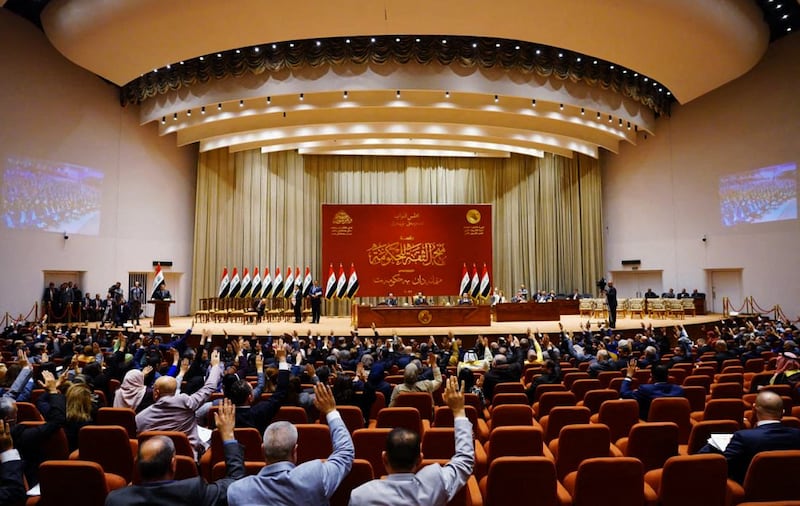Iraq’s parliament took a major step towards approving its national budget after overcoming disagreements about how to manage oil revenue from the semi-autonomous Kurdistan region, which had held up passage for three days.
Voting on the budget bill began on Thursday. MPs had approved two dozen of the 67 sections of the critical legislation by the early hours of Saturday morning, but hit an impasse over Article 14.
The article introduces significant changes in the Kurdistan region’s hydrocarbon industry, giving Baghdad far greater oversight than it had previously.
It will also upend political dynamics within the Kurdistan region by authorising individual governorates to petition Baghdad for a separate budget if they feel that the Kurdistan Regional Government is not giving them a fair share of funding.
Critics, particularly within the Kurdistan Democratic Party, argue that the changes will undermine the Kurdistan region’s power and constitutional status.
Despite these objections, Article 14 was passed at around midnight with the session paused immediately afterwards. Parliament is expected to reconvene on Sunday afternoon to debate dozens of other parts of the budget needing approval.
Prime Minister Mohammed Shia Al Sudani’s government introduced draft budget legislation in March, but its progress through parliament has been halting.
“The stakes are high,” said Mohanad Adnan, a Baghdad-based political analyst at Roya Development Group.
“Historically, competition was between the Shiite, Sunni and Kurdish blocs, but now there is an intra-bloc layer of competition, drastically complicating negotiations,” he said.
The legislation is Iraq’s largest ever proposed budget at $153 billion and will run for three years until 2025. The Kurdistan region’s share of 12.67 per cent was confirmed in a vote on Friday night.
“A lot of this spending is for providing more public sector jobs,” said Zeinab Shuker, a sociology professor at Sam Houston State University.
This was a strategy by Mr Al Sudani and his government to win re-election, she said.
While this may appeal to many jobless Iraqis, including the growing youth population, Ms Shuker said it was short-term thinking.
“This is not going to be sustainable,” she said. “The budget works with $70 per barrel for oil, any decline and Iraq will not be able to deal with it very effectively.”
Brent closed at $75.04 per barrel on Friday.
Nevertheless, issues of federalism and control of the oil industry in the Kurdistan region were the most contentious and have been the reason for the repeated delays.
The KDP, which is a crucial member of Mr Al Sudani’s governing coalition, objected to amendments introduced by the parliamentary finance committee late last month. They viewed them as contrary to a temporary agreement reached in April between Mr Al Sudani and KRG Prime Minister Masrour Barzani.
Some of that language was softened in the final version, which still resulted in a significant new role for Baghdad.
The KDP also opposed a provision in Article 14 that was strongly supported by the Patriotic Union of Kurdistan party that gives governorates in the Kurdistan region the ability to petition for a separate budget from Baghdad if the KRG does not fairly distribute funds.
The PUK has long accused the KDP of using its control of the Kurdistan region’s oil industry to deny Sulaymaniyah governorate, where the PUK is in control, its fair share of funding relative to KDP strongholds in Erbil and Duhok.
This clause passed in the final version will likely exacerbate tensions between the two parties.
A provision backed by Kurdish opposition parties was removed from the budget bill on Saturday. It would have compelled the KRG to repay 10 per cent of the money that it had withheld from the salaries of public servants as part of austerity measures introduced in 2014.
“The political tit-for-tat led some Kurdish parties to prefer working with the federal government rather than the KRG, weakening the role of the region,” Mr Adnan said.
“Combined with the [Federal Supreme] Court’s ruling against the Kurdistan region’s oil exports, Baghdad is more directly involved in the region’s affairs than ever.”






